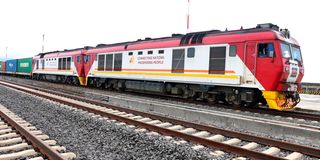Developing story: Iranian President Ebrahim Raisi confirmed dead in chopper crash
Electric SGR plan timely

An SGR train at the Naivasha Inland Container Depot on January 17, 2022. The government’s plan to electrify the standard gauge railway (SGR), as proposed by the World Bank, is timely and the relevant agencies ought to commence its implementation.
The government’s plan to electrify the standard gauge railway (SGR), as proposed by the World Bank, is timely and the relevant agencies ought to commence its implementation. Kenya has vast amounts of geothermal potential, which, if exploited, is enough to power the trains.
First, the use of locally generated electricity will reduce, or even remove, dependence on imported diesel. That will save the country millions of shillings annually in fuel imports. Secondly, geothermal power is the greenest source of energy. Using it for SGR will, therefore, make Kenya a global leader in harnessing geothermal to power its transport sector.
If successful with SGR, the project should be extended to other train services—including the commuter trains that serve Nairobi and adjacent areas.
Compared to countries like South Africa, the consumption of electricity in Kenya is very low. That makes it difficult for Kenya to compete economically with South Africa on energy production and consumption, the twins that literally power economic growth. Tanzania has often expressed its intention to build an electric railway line while Ethiopia has.
Kenya cannot afford to be left behind, given that it has historically positioned itself as the gateway to the East African Community (EAC) and regional economic powerhouse. It should no longer rely on fossil fuels when its neighbours have gone electric.
Geothermal use will cut carbon emissions, making this switch a no-brainer for any forward-thinking government. This is especially important now that Kenya has a partnership with Germany, which has offered to supply KenGen with equipment to dramatically reduce the time to drill a geothermal well.
But there must be a demand side—and the lowest-hanging fruit in this regard is the SGR. Should that be successful, then it can serve as a template for other players in the transport sector to follow suit.
Ms Afandi is a journalism and communication student at Rongo University. [email protected].





